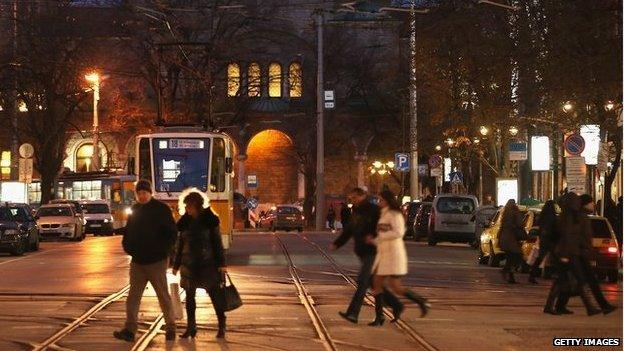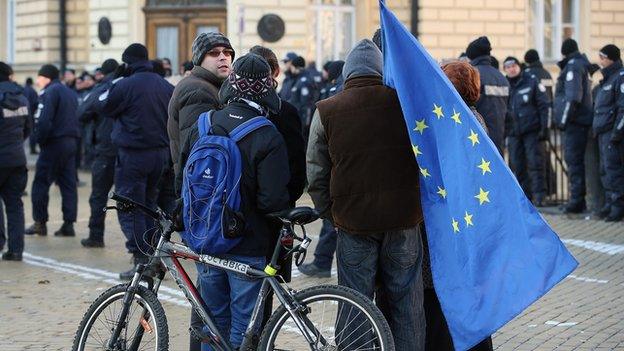Voices: Bulgaria and Romania working rights in EU
- Published

Sofia, Bulgaria: The two countries' governments say there are no grounds for alarm about EU migration
On 1 January 2014 Bulgarians and Romanians will gain the same rights as other EU citizens to work throughout the European Union.
Nine countries are lifting working restrictions at the end of the year. The temporary controls were imposed when the two neighbours joined the EU in 2007.
Media in some countries have expressed concerns about an expected influx of migrants from the two poorest countries in the EU.
Here people in Romania and Bulgaria reflect on what the change will mean for their countries.
Ionut Babencu, 31, IT worker, Bucharest, Romania

Ionut thinks people will only leave if jobs are available.
I have friends who are already working in the UK. I tried finding a job there, but so far it has not gone past the phone interview stage.
If I am able to find one that pays better than here, I'll gladly go to Britain and work.
The living standards in the UK are way better than Romania's. In Romania there is corruption everywhere.
But I won't leave until I have a job waiting for me, it is too costly to go there and look for work.
People that want to work - and pay taxes - will have an easier time to find a job now when the work restrictions are lifted.
I think people will only go if jobs are available.
The people that are doing illegal things in other countries - like begging - are already there. There won't be many to join them.
People are leaving Romania and every year it gets worse. For example, doctors aren't paid well, so some might decide to leave.
But I don't think people are worried about the number of people leaving the country, they just accept it.
Lyuba Gerassimova, 27, public sector worker, Sofia, Bulgaria
I don't believe there will be a mass exodus when the rules change - the "brain drain" has already happened.
It is still happening, with low living standards and dysfunctional education here.
I started noticing more students studying abroad two or three years after we joined the EU, as tuition fees dropped.
I know many students who stayed on in their host countries. Even if they need work permits it is easier to apply from abroad.

Older people worry about the number of people leaving, says Lyuba
I studied international relations and work in the public sector. In my subject area, there is a greater choice of diploma abroad, and I have studied both in Germany and Austria.
In the long run, I think more and more qualified people will leave the country. For example, it is hard to pay off student loans taken out abroad with Bulgarian wages. I will have to go and work elsewhere so I can pay off my loans.
I think older people do worry about the number of people leaving the country and leaving them behind. I don't think young people worry so much about this.
I would like to live and work abroad for a few years. But other factors - like the weather - will affect my choice of destination.
Blagovest Chopakov, 19, student, Sofia, Bulgaria
As a Bulgarian I strongly support the right of free movement across the EU.

Blagovest might move to another EU country
I have a relative who is working in the UK and is doing well there.
I do think that more people will decide to go to other countries when the rules change in 2014. Bulgaria could end up losing qualified workers in many sectors.
This could be a negative thing, and I would like to see people stay to help improve conditions in Bulgaria. We hope that our economy will improve in 2014 and so more people will decide to stay and help contribute to our country.
As a young man, I may also want to go to an EU country to study and work. But I'll go there to do these things, not to get benefits.
Those Bulgarians and Romanians that do choose to move in 2014 will contribute to the economy of the country they move to.
I think the UK media have portrayed Bulgarians and Romanians in the wrong way. They only seem to show the gypsies, their wagons and the extremely poor conditions they live in.
My friends believe there has been an unfair campaign against Bulgaria and Romania.
We are all Europeans and we shouldn't discriminate against countries - such as Bulgaria and Romania - that are poorer.
Rares Dadarlat, 30, engineer, Sebes, Romania
I don't think things will change much actually. Going abroad for work requires certain skills and an initial investment.
The friends I talk to usually have the same impression.
I think there is a distinct lack of awareness that the change is coming. Everyone has their own problems to deal with and the change in rules is not something we have been waiting for as a nation.
The people that are qualified and willing to go and work abroad have already done so.
If people want to go abroad I don't think the UK will be their prime destination. I think people will prefer Latin-language countries such as France and Spain.

There is a lack of awareness that the change is coming, says Rares
I have a lot of friends who have gone abroad to work, usually highly qualified people who have gone to Germany. I cannot blame them. I would leave myself if I did not have responsibilities that keep me here.
The so-called "brain drain" is present in Romania due to the low wages qualified people are able to earn. But it will not be any worse than it was, say, during the last six years since our accession to the EU.
Highly qualified people will continue to leave the country, but I think other countries - such as the UK - have the same problem.
I think we have to resolve this situation internally; we have to make it more attractive to work in Romania.
Interviews by Nathan Williams, BBC News
- Published14 May 2014

- Published26 December 2013

- Published3 November 2014
